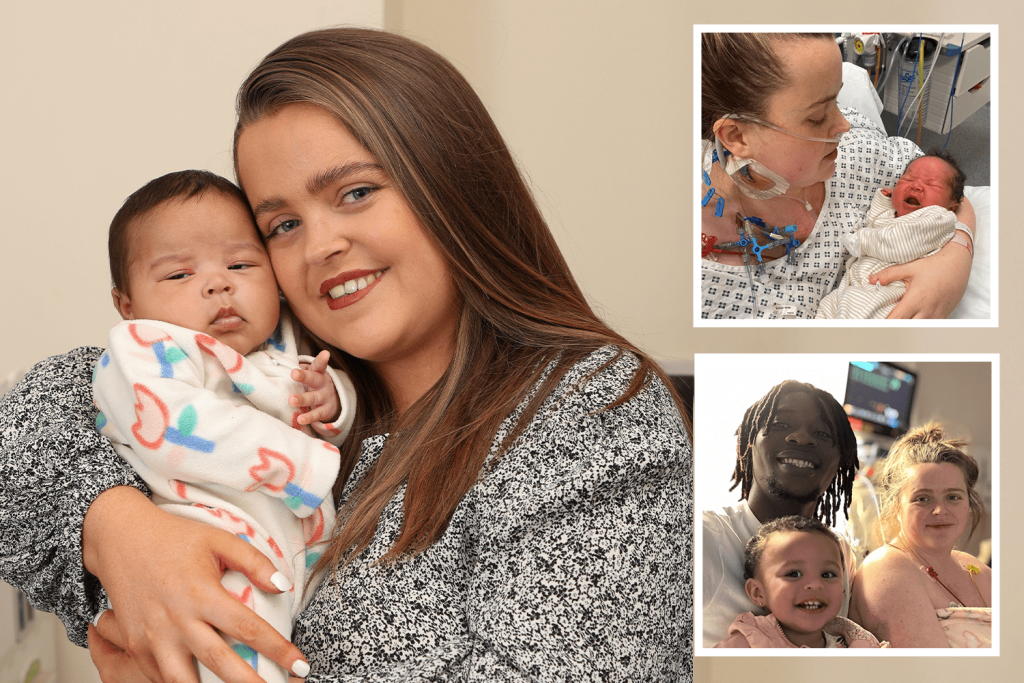Natasha Sokunbi, a 30-year-old care support worker, experienced a life-threatening medical emergency while 37 weeks pregnant. She collapsed in the waiting room of the Royal Stoke Hospital after arriving for what she believed was a chest infection. Within minutes, Natasha’s heart stopped, leaving her clinically dead for 14 minutes. In a remarkable display of teamwork and rapid response, a 30-member medical team simultaneously performed CPR, administered oxygen, and executed an emergency Caesarean section. Against the odds, baby Beau was delivered alive, though Natasha remained unconscious and was placed in an induced coma. This dramatic event unfolded just five minutes after Natasha checked into the hospital, highlighting the swift and unexpected nature of the crisis.
The incredible efforts of the medical team were described as “nothing short of miraculous” by Dr. Andrew Bennett, one of the first responders. He emphasized the rarity of both mother and baby surviving such a scenario, attributing the positive outcome to the speed and coordination of the medical staff. The procedure, known as a resuscitative hysterotomy, requires immediate action as the baby’s life is directly dependent on the mother’s circulation. Dr. Bennett explained that every minute counts in these situations, and the baby’s heart is likely to stop shortly after the mother’s. The team’s ability to deliver Beau while maintaining Natasha’s resuscitation efforts was crucial to their survival. The fact that Natasha’s cardiac arrest occurred within a hospital setting was also a significant factor in the successful outcome, allowing for immediate intervention by a skilled team.
Natasha remained in a coma for three days, unaware of the dramatic events surrounding her daughter’s birth. Waking up disoriented and in pain, her first concern was for her baby. She experienced both confusion and guilt, fearing she had harmed Beau during her collapse. Upon learning of the successful delivery and seeing a photo of her newborn daughter, Natasha was overwhelmed with relief and gratitude. She remained anxious about her heart condition during her hospital stay, fearing another cardiac arrest and the possibility of not seeing her children again. Natasha’s recovery involved regaining her strength and learning to walk again.
The underlying cause of Natasha’s cardiac arrest was a genetic heart condition, which she had previously managed and believed to be under control. While aware of the risks associated with pregnancy, she had received regular check-ups with her cardiologist and experienced a healthy pregnancy up until the incident. Dr. Bennett stressed that Natasha’s arrival at the hospital was providential, as the outcome could have been drastically different had the cardiac arrest occurred elsewhere. He described the event as both terrifying and inspiring, a testament to the dedication and expertise of the medical professionals involved. This rare occurrence is considered a “once in a career event” for an emergency doctor.
Natasha and Beau were able to return home in time for Christmas, a joyous reunion for the family. Now a mother of two, Natasha cherishes life with a newfound appreciation, acknowledging the second chance she was given. The experience has left her with a greater sense of gratitude and a determination to not take anything for granted. She continues to recover, regaining her independence and focusing on her family. The heroic efforts of the medical team at Royal Stoke Hospital were recognized with the Chief Executive Award from University Hospitals of the North Midlands NHS Trust, a fitting tribute to their life-saving actions.
The timeline of events underscores the rapid escalation of the situation. From calling NHS 111 on December 2nd with a suspected chest infection, Natasha was in a life-or-death situation within 24 hours. The swift response of the medical team at the Royal Stoke Hospital undoubtedly saved both her life and her daughter’s. The successful resuscitative hysterotomy, despite its low statistical success rate, serves as a remarkable testament to the power of prompt and coordinated medical intervention in critical situations. Natasha and Beau’s story is a beacon of hope and a testament to the resilience of the human spirit.


